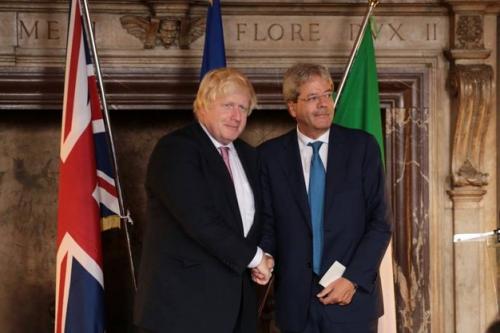Interview: Ambassador upbeat on post-Brexit UK-Italy ties

ROME – The British Ambassador to Italy, H.E. Jill Morris, CMG, reiterated Wednesday that Britain will respect Italians’ rights in the UK as long as those of Britons in Italy are respected following Brexit. However, the British envoy said she feels very strongly personally about the plight of British lecturers discriminated against in Italian universities (lettori), noting that, unfortunately, “funds have not been very forthcoming” to compensate them.
“I myself feel very strongly and have been very involved in this issue,” Ms Morris, the first female British ambassador to Italy, said in an exclusive interview with the Italian Insider. “It is certainly an issue that must be addressed.”
Whilst acknowledging that Italian governments have been cooperative on the matter, the senior diplomat noted that “the necessary funds have not yet been forthcoming,” and that the British Prime Minister, Theresa May, and the Foreign Secretary, Boris Johnson, are “doing all they can” to resolve the lettori issue.
The senior diplomat said she is optimistic on the future of Italian-British relations following Brexit.
Ms. Morris underlined that “the British people are still Europeans – historically, geographically, culturally and even emotionally. We share the same values as other European Union member states, the same principles of human rights and rule of law, and Britain is still very much committed to the defence of Europe.”
The senior emissary was certain that a “smooth Brexit” would be carried out “as constructively as possible,” meaning the process will be “well organised and prepared” for both Britain and also other EU member states.
“The rights of the British people will be addressed very early on in the negotiations,” said the ambassador, and “as long as the rights of the British people are respected, we shall also respect the rights of Italian citizens.”
She also drew attention to a recent British Embassy survey which received over 1,000 voluntary responses from the British expatriate community. The information collected will prove useful in evaluating “how the Embassy can reach out, and what forms of communication work best.”
Asked if life will get harder for young Brits travelling and studying abroad once negotiations end and Brexit truly gets into full swing, Ms. Morris said, “I cannot say for certain what will happen as the process is a negotiation.”
However, she underlined the aim of the British government to “keep the United Kingdom open,” enabling British young people to travel without difficulty and also keeping British universities open to European students too. “This is very important,” the ambassador said.
Asked to describe the best aspects of her time living and working in Italy so far, Ms. Morris said, “I have loved everything so far! Getting to know Rome is fantastic!”
Expanding upon her travels to Florence, Venice, Milan, Verona and Naples, the British Ambassador said that it is a great opportunity “getting to know the wonderful Italian people, from every sector – be it business or politics.”
It has been a “real joy” to see that not only do British people admire Italian culture, but that “the Italian people also have a real affection for Britain too,” the British ambassador said.
jp-ppw-sw



